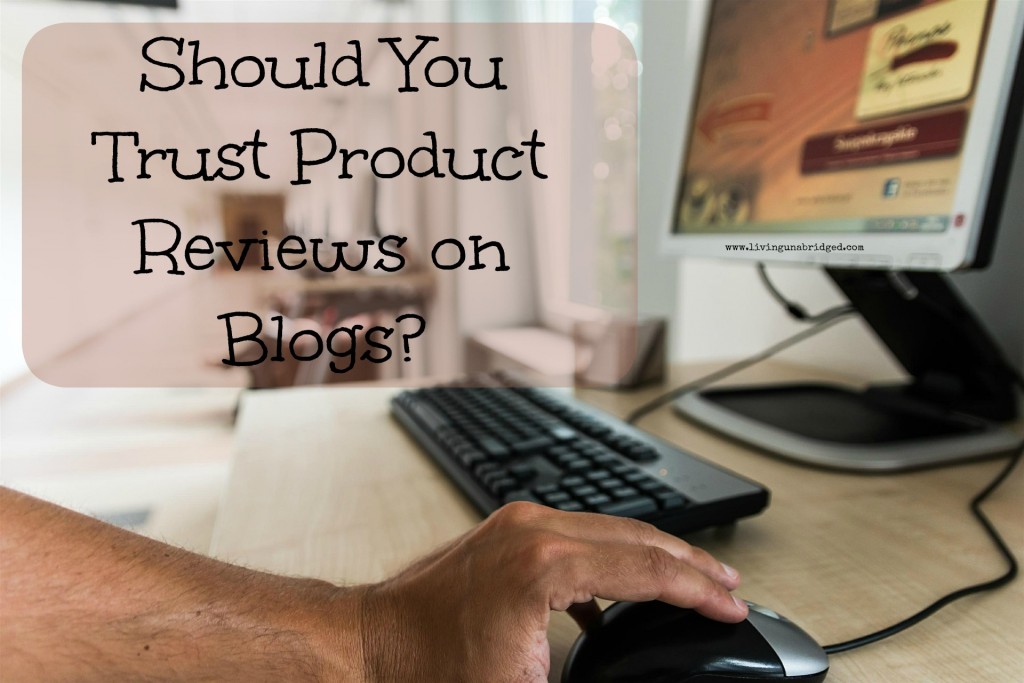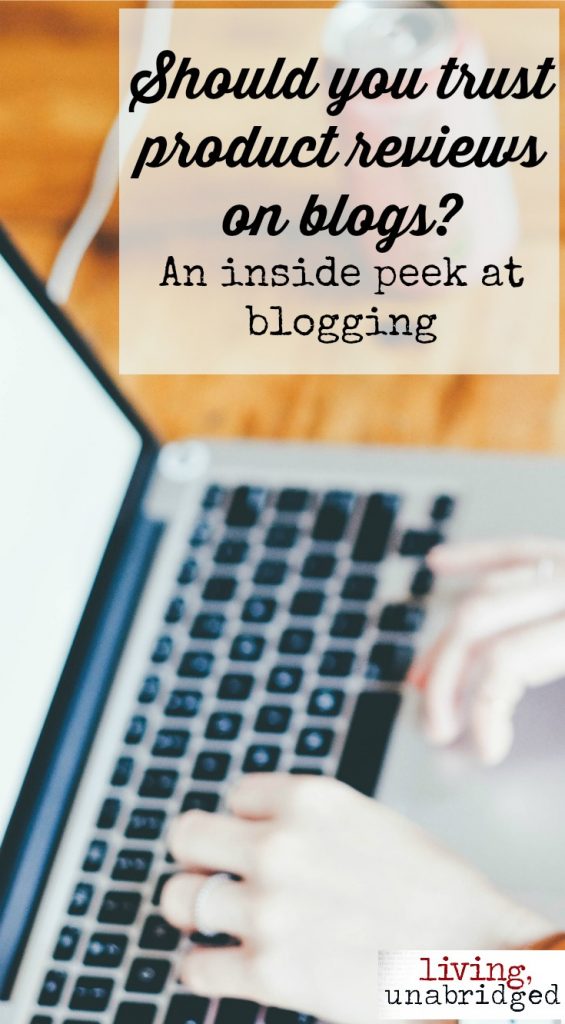Advertising today constantly bombards us: billboards, TV commercials, junk mail, print ads, pop-ups, spam, and tweets... With all the different options available to advertisers today, how do we evaluate what we see and read? Marketing departments get creative to try to stay ahead of the consumers they're targeting.
Most companies have realized the power of social media and blog marketing. (Yes, I still believe that in 2017 the power of blogging and bloggers is far from extinct.)

Bloggers working to provide for their families (many stay at home moms, like myself) can avail themselves of affiliate networks, sponsored posts, ads, and more to monetize their work. (Blogging isn't free. Hosting can be expensive, depending on how many hits a site gets. And let's remember that everyone's time is worth something.)
 Where do product reviews come from?
Where do product reviews come from?
First, the bad news: these reviewers are not necessarily chosen because of their expertise in the subject or on the product. How many hits a site gets usually decides the question.
So, if a blog is incredibly popular, the company wanting their product (let's say, dog food) promoted doesn't necessarily worry about whether said blog is a good fit to promote dog food. (Or even if that blogger has a dog.) Ad networks and companies would prefer a good fit for their brand and a lot of hits, but if they have to choose only one, they'll take the site with more hits.
Many bloggers join networks which make these product review opportunities available only within those groups. A company pays the network to promote their product or service and the network assigns those reviews or ad campaigns to their bloggers or social media crew. These networks use different criteria to choose their promotion teams, but stats (number of readers per month) are always a main component. (Which makes sense. If you were paying for someone to promote your product, wouldn't you want the most people to see that promotion?)
 Now, with that fact in mind, how can we best evaluate all the product reviews or ads we see?
Now, with that fact in mind, how can we best evaluate all the product reviews or ads we see?
- Always ask yourself "Cui bono?" This Latin phrase simply means "who benefits?" Judge whether the posted information helps the reader, or only the company in question.
- Ask for more information in the comments. If the review didn't say anything negative ask, "Is there anything you didn't like about this product?" or "Did anything about this product not work for you?" A blogger with integrity will offer that information in the post itself. But if they don't, you can always ask.
- Compare what you know about the blogger to the product they're promoting. Does this blogger involved in the Twitter dog food campaign even like animals? (Sorry to keep harping on dog food. It's just an example. You won't see me promoting a specific dog food over another for one simple reason: we don't own a dog. When that changes I'll let you know.)
- Negative reviews can actually be more helpful than positive reviews, if the reviewer actually explains specifically what they didn't like or why a particular product didn't quite work for their family. Just because it doesn't fit them, doesn't mean it won't fit you. The more information, the better.
- Be wary of sites (including blogs) without proper disclosure of affiliates, sponsored or non-sponsored posts, and other FTC regulations. These disclosures are actually required by law.
- Compare how many original content posts (non-sponsored) there are compared to sponsored posts or posts specifically promoting a product. Reliable blogs will have a balance. If I can't find the content because there are so many ads popping up or covering the screen, I'm not going to stick around very long.
- Does the stated purpose of the blog match the content? For instance, how many of us have seen blogs that are supposedly about saving money or living frugally that are pushing $19.95 scarves or home decor? Intent and content should be similar.
- Is there follow-up weeks or months later? A blogger still talking after an ad campaign has ended about how much she loves the product is a blogger who really did like what she was promoting. A blogger paying out of her own pocket for a service after her trial ended is someone who liked the service. In the case of a book review, is the blogger still recommending the book later in the year?
- Would the blogger actually pay for this product? Honest reviewers will tell if they think a product is a good value. "This was lovely for the introductory price, but I'm not sure I could see paying $25 per month," or statements to that effect, are signs the blogger is being truthful and keeping her readers' needs in mind. (While remembering that everyone has different priorities and budgets.)
 So, without letting cynicism get the best of us, we as readers need to practice wisdom and discernment.
So, without letting cynicism get the best of us, we as readers need to practice wisdom and discernment.
I've been blogging since 2007. Unfortunately, I've seen practices that disappoint me. (Things like "giveaways" that required a credit card number or blatant misrepresentations of services.) I've met a few bloggers in person who were nothing like their online persona.
But I've also met people who are genuine, with good intentions, and working much harder than it may seem. Believe it or not, words do not just automatically appear on a screen when a blogger sits down at her computer. Online courses don't just write themselves. Graphics and edited photos do not spring fully formed from the blogger's imagination. Posts don't just automatically spring from a blog on to FB, Twitter, Pinterest, or Instagram. (Although there are services that assist bloggers in sharing our work. Once again, the best of these have a fee associated with their use.)
Carving out your own corner on the world wide web isn't free.
I don't know any good company who wants to give a false representation of themselves. After all, happy customers return for another purchase, recommend the product or service to others, or renew their subscriptions.
 Where can you find recommendations from Living Unabridged?
Where can you find recommendations from Living Unabridged?
There's a resources page called Consider for things I use and recommend on a regular basis. At the end of posts you'll find simple banner ads for places I shop. If a post is sponsored by a specific company, I'll let you know that with the proper disclosures. You will not find pop-up ads or auto-play ads on this site. Why? Because we hates them. [/gollum voice]
My absolute favorite monetization option is affiliate marketing because it doesn't cost my readers anything extra. Amazon is probably the best example of this. When a reader clicks on a book title on a Living Unabridged post and then orders something from Amazon, Living Unabridged may receive a few pennies from that transaction but it doesn't add anything to the reader's Amazon bill.
Here's a bonus question: why do so many blogs want me to subscribe or give my email address?
Because your email remains the most reliable way to contact you.
The vagaries of social media infuriate bloggers. Facebook changes their algorithms all the time. Pinterest and Twitter follow suit. Just because you follow or "friend" a specific blog or webpage does not mean you will always get updates for that site via your favorite social media. (Aggravating, but true, for blogger and reader alike.)
"Grow your list" is the advice given to bloggers most frequently. It's not nefarious or trying to be obnoxious. That blogger just wants to be able to find you again in the future when they've written or shared something new that you might like.
(If you're wondering why Living Unabridged doesn't ask for your email address, well, I hate getting emails and I've just never bothered to set up a newsletter option for keeping up with new posts. Maybe someday, when time and budget allow, but for now I'll have to rely on the good graces of my social media platforms. *cough*)
I hope this gives you a behind the scenes peek at blogging and product reviews.
Honest bloggers are not trying to trick you into buying things you don't want although we do try to put things in a positive light, when possible. (After all, why would a company pay us to tear down their product?)
When a company that a blogger loves connects with an audience that appreciates the product / service, that is a great outcome for the blogger, reader, and the company.
Resources for Living Unabridged Readers:



